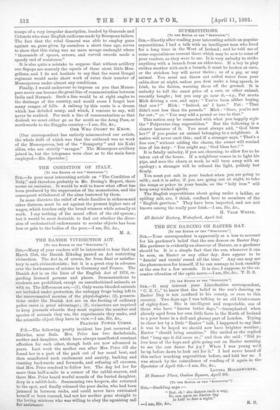SUPERSTITIONS.
[To THE EDITOR OP THE " SPEOTA.T011."] SIR, —Shortly after reading your interesting article on popular superstitions, I bad a talk with an intelligent man who lived for a long time in the West of Ireland ; and he told rue of some superstitions current there which may be new to some of your readers, as they were to me. It is very unlucky to strike anything with a branch from an. elder-tree. If a boy in play strikes another with such a branch, it must be broken at once, or the stricken boy will never thrive ; so of a pig, or any animal. You must not throw out soiled water from your cabin-door at night, unless you first make a long speech, in Irish, to the fairies, warning them off the ground. It is unlucky to tell the exact price of a cow, or other animal, recently bought ; but you may go near it,—e.g., Pat meets Mick driving a cow, and says : "You've been afther buying that cow P" Mick: "Indeed, an' I have." Pat : "That didn't cost less than tin pounds." Mick : "Sure, you're not far out ; " or, "You may add a pound or two to that."
This notion may be connected with what you happily style the " Polycrates ring superstition." But the following is a clearer instance of it. You must always add, "God bless her!" if you praise an animal belonging to a neighbour. A native will never omit this; and if a stranger says, "That's a fine cow," without adding the charm, the owner will remina him of his duty : "You might say, 'God bless her!"
It is fatally unlucky, if you are churning, to allo* fire to be taken out of the house. If a neighbour comes in to light his pipe, and sees the churn at work, he will turn away with an apology ; a stranger will be refused the light, politely but firmly.
You must put salt in your bucket when you are going to- milk ; and it is safer, if you are going out at night, to take the tongs or poker in your hands, as the "holy iron" will keep away wicked spirits.
The English superstitions about going under a ladder, or spilling salt, are, I think, confined here to members of the " English garrison." They have been imported, and are not known among the really poor Irish.—I am, Sir, &c.,


































 Previous page
Previous page